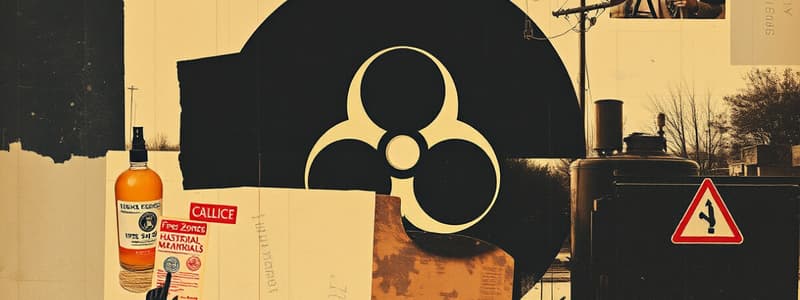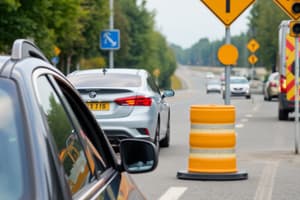Podcast
Questions and Answers
What should the Incident Commander select when the fire is still in a controllable stage?
What should the Incident Commander select when the fire is still in a controllable stage?
- Offensive Mode (correct)
- Defensive Mode
- Evacuation Mode
- Overhaul Mode
When should tactical priorities for hose line placement start with Rescue?
When should tactical priorities for hose line placement start with Rescue?
- When only exterior application is possible
- After the fire has spread beyond control
- When there is evidence of structural failure
- When no Rescue profile exists (correct)
What is the primary purpose of applying water externally during fire operations?
What is the primary purpose of applying water externally during fire operations?
- To extinguish the fire solely
- To provide a cooling effect and possibly increase survivability (correct)
- To prevent structural collapse
- To minimize smoke production
What does SOG 220-01 dictate regarding personnel accountability during fire operations?
What does SOG 220-01 dictate regarding personnel accountability during fire operations?
Which tactical priority follows Rescue in the hose line placement sequence?
Which tactical priority follows Rescue in the hose line placement sequence?
What is the primary role of a Water Supply Officer during an incident?
What is the primary role of a Water Supply Officer during an incident?
What should be considered by the Incident Commander before deciding on an Offensive Mode operation?
What should be considered by the Incident Commander before deciding on an Offensive Mode operation?
Why is the tactical priority of Extinguishment generally required after Confinement?
Why is the tactical priority of Extinguishment generally required after Confinement?
What is the minimum flow rate required for initial exposure hose lines?
What is the minimum flow rate required for initial exposure hose lines?
Which of the following should be utilized for exposure protection?
Which of the following should be utilized for exposure protection?
In what scenario can elevated streams be deployed during a fire incident?
In what scenario can elevated streams be deployed during a fire incident?
What should firefighters do if elevated streams are deployed?
What should firefighters do if elevated streams are deployed?
What is a key requirement before permitting interior operations after a fire incident?
What is a key requirement before permitting interior operations after a fire incident?
Which of the following statements about Control Zones is accurate?
Which of the following statements about Control Zones is accurate?
Which harmful toxins may be produced by modern day fires?
Which harmful toxins may be produced by modern day fires?
Ground monitors provide which of the following advantages?
Ground monitors provide which of the following advantages?
What defines an Exclusion Zone during a fire incident?
What defines an Exclusion Zone during a fire incident?
What is a primary characteristic of the Hot Zone?
What is a primary characteristic of the Hot Zone?
Which zone is primarily designated as having no risk and is ideally located uphill and upwind?
Which zone is primarily designated as having no risk and is ideally located uphill and upwind?
What is the objective of overhaul in fire operations?
What is the objective of overhaul in fire operations?
What role does a Thermal Imaging Camera (TIC) play during overhaul?
What role does a Thermal Imaging Camera (TIC) play during overhaul?
What should be prioritized during overhaul operations?
What should be prioritized during overhaul operations?
Which statement is true regarding the Warm Zone?
Which statement is true regarding the Warm Zone?
What significant hazard does blown-in cellulose insulation present?
What significant hazard does blown-in cellulose insulation present?
Study Notes
Control Zones
- Toxins released during fires can be colorless and/or odorless gases.
- Control Zones help manage risks at fire incidents and include four distinct areas:
- Exclusion Zone:
- High-risk area. Entry is prohibited for everyone, including Fire Rescue and civilians.
- Hot Zone:
- Area with high risk near fires or combustion products, including smoke and soot.
- Warm Zone:
- Area with minimal risk away from immediate fire threats.
- Cold Zone:
- Risk-free area, ideally located uphill and upwind from the hot and warm zones.
- Exclusion Zone:
Overhaul
- Overhaul aims to uncover hidden fires and ensure complete extinguishment.
- It adheres to priorities: Life Safety, Incident Stabilization, Property Conservation, and Evidence Preservation.
- Total extinguishment includes extinguishing smoldering fires and using Thermal Imaging Cameras (TIC) to identify heat.
- Blown-in cellulose insulation poses a significant rekindle hazard.
Tactical Priorities
- Tactical priorities focus on protecting exposures and confining the fire.
- Initial exposure hose lines should use 2½” hose flowing at least 200 GPM.
- Exposure protection can be achieved using ground monitors or mounted deck guns, which provide optimal flow and firefighter safety.
- Ground monitors can remain unattended when positioned in a collapse zone.
- Elevated streams may be employed when a building is considered a loss, ensuring firefighter safety by avoiding interior operations.
Incident Command Considerations
- The Incident Commander must reassess the Incident Action Plan (IAP) as situations evolve.
- Firefighters must not engage in interior operations until the structure is evaluated for integrity, with careful assessment of trusses and roofs.
- Control Zones may not always be visibly marked; awareness of their presence is still crucial.
Offensive Mode Operations
- Offensive Mode involves firefighters advancing into a building to combat the fire directly.
- Personnel must adhere to safety protocols established in SOG 220-01 and SOG 220-02.
- The Incident Commander triggers Offensive Mode if the fire is manageable and there is no imminent structural failure.
- Tactical priorities for fire attack include:
- Rescue: Ensure safety for rescuers and occupants.
- Exposure Protection: Guard against fire spreading to other structures.
- Confinement: Limit the fire's spread.
- Extinguishment: Actively suppress the fire.
Studying That Suits You
Use AI to generate personalized quizzes and flashcards to suit your learning preferences.
Related Documents
Description
Test your knowledge on fire incident control zones, including the crucial definitions and purposes of exclusion zones. This quiz emphasizes the importance of recognizing risks in hazardous situations, particularly when it comes to invisible and odorless toxins. Familiarize yourself with the guidelines outlined in SOG 320-03 for effective atmospheric monitoring.




